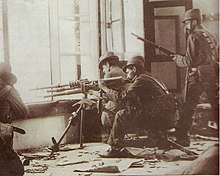
Back Decena Tráxica AST Decena Trágica German Decena Trágica Spanish Décade tragique French Tragikus tíz nap Hungarian 悲劇の十日間 Japanese ტრაგიკული დეკადა Georgian 비극의 열흘 Korean Decena trágica Dutch Decena Trágica Portuguese
| Ten Tragic Days | |||||||
|---|---|---|---|---|---|---|---|
| Part of the Mexican Revolution | |||||||
 Rebel followers of Félix Díaz in the Mexico City YMCA during the coup against Madero | |||||||
| |||||||
| Belligerents | |||||||
|
Maderistas |
Porfiristas Reyistas Felicistas Supported by: | ||||||
| Commanders and leaders | |||||||
|
Lauro Villar Ángel Ortiz Monasterio Victoriano Huerta (9-16 February) Ángel García Peña (WIA) Felipe Ángeles |
Félix Díaz Bernardo Reyes † Manuel Mondragón Aureliano Blanquet Gregorio Ruiz † Victoriano Huerta (16-19 February) | ||||||
| Casualties and losses | |||||||
| 5,500 dead | |||||||
| Victoriano Huerta switched from pro-Madero to anti-Madero during the fighting | |||||||

The Ten Tragic Days (Spanish: La Decena Trágica) during the Mexican Revolution is the name given to the multi-day coup d'état in Mexico City by opponents of Francisco I. Madero, the democratically elected president of Mexico, between 9-19 February 1913. It instigated a second phase of the Mexican Revolution, after dictator Porfirio Díaz had been ousted and replaced in elections by Francisco I. Madero. The coup was carried out by general Victoriano Huerta and supporters of the old regime, with support from the United States.
In the ten days of violence, the aim was to "create the illusion of chaos necessary to induce Madero to step down" from the presidency.[2] Rebels led by General Félix Díaz, nephew of ex-president Porfirio Díaz, and General Bernardo Reyes escaped from jail and rallied forces to overthrow President Francisco I. Madero. The coup was strongly supported by U.S. Ambassador to Mexico, Henry Lane Wilson, who was implacably opposed to Madero. Madero had retained the Mexican Federal Army after rebels had forced the resignation of President Porfirio Díaz. The head of the Mexican Federal Army, General Victoriano Huerta, ostensibly the defender of the Madero government, defected to the rebels, who sought the return of the old political order. On 18 February the sitting president and vice president were captured by rebel General Aureliano Blanquet, effectively ending the Madero's presidency. On 19 February, a dispute between General Díaz and General Huerta about who should head the provisional government was resolved by Ambassador Wilson mediating between the two in an in-person meeting at the U.S. embassy. They formalized an agreement known as the Pact of the Embassy.
For ordinary citizens of Mexico City, the ten days of bombardment and displacement were horrific. While most fighting occurred between opposing military factions, assaulting or defending Madero's presidency, artillery and rifle fire inflicted substantial losses among uninvolved civilians and major damage to property in the capital's downtown. The February 19 pact between the two rebel generals put an end to the violence in Mexico City, and marks the end of the 10 days.[3] But the political drama continued. While in custody, Madero and his vice president resigned, expecting that they would be allowed to go into exile, but they were subsequently murdered on 22 February 1913. General Huerta became President of Mexico, with the support of the U.S. and German ambassadors and most Mexican state governors.
A broad revulsion against Huerta's coup and the murders led to a third phase of the Mexican Revolution: civil war between Huerta's illegitimate central government and the many revolutionary armies in northern and southern Mexico, who fought to take Huerta out of power and prevail against one another. Madero's martyrdom shocked a critical portion of the Mexican population, as well as the newly inaugurated U.S. President Woodrow Wilson, who in a change of mind of American foreign policy, refused to recognize Huerta's government.
- ^ Album, Mexican Revolution
- ^ Zolov, Eric. "Henry Lane Wilson". Encyclopedia of Mexico, 1608.
- ^ Grieb, Kenneth J. "Decena Trágica". Encyclopedia of Mexico, 362-63
© MMXXIII Rich X Search. We shall prevail. All rights reserved. Rich X Search